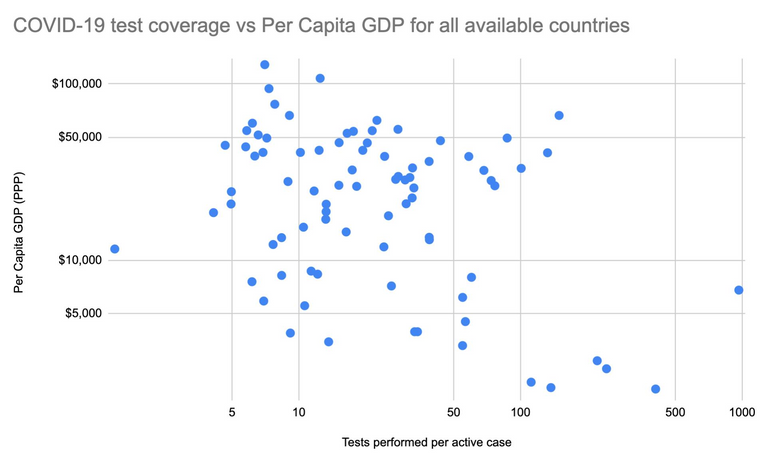
There has been some discussion recently about the risk of terrible COVID-19 outbreaks happening in the developing world, where public health budgets are much smaller. This is happening in Ecuador right now.
However, I noticed that a lot of the countries that seem to be doing particularly well at handling COVID are not the wealthiest ones. In Europe, Czechia, Slovakia, Bulgaria, Greece are among the poorest in Europe but have been doing better than their wealthier neighbours. Vietnam is an example of a very poor country that has nonetheless done a great job of keeping their caseload down. These are just anecdotes though.
To address this systematically, I think test:case ratio is a good measure of how well a country is doing in the pandemic -- if a lot of tests are being done for each positive case, it generally means that people can get tested at the first sign of symptoms, and their contacts can get tested as well. Countries with high test:case ratios tend to be looking at declining caseloads.
I graphed out test:case ratio vs per capita GDP, and they're barely correlated -- in fact it suggests that poorer nations are doing slightly better on their test:case ratios. This is true whether I use nominal per capita GDP or PPP.
Is this a fair way of measuring this? If it's true, what happened?
Some ideas:
- Did poorer nations have outbreaks later because they have less inbound international travel, so they had more of a chance to ramp up on knowledge and testing capacity first?
- Are more of these nations equatorial or in the southern hemisphere, so they get a slight benefit right now from increased UV rays?
- Are poorer nations more used to scrounging and doing quick-and-dirty measures without a lot of bureaucracy and oversight. and thus are faster to respond in a crisis?
- Are poorer countries more used to dealing with serious disruptions of all kinds, making them less brittle than the tight low-margin systems in developed countries?
- Can poorer nations more quickly stand up a labor force of contact tracers?
- Are citizens of rich countries too used to not taking pandemics seriously because they think they have good medical systems to protect them, whereas poor countries are used to the experience of having to combat various epidemics?
- Are we getting unreliable data from poor nations?
- Are some countries omitted from the records because there's no data from them at all?
what do you mean risk? they are all f&cked
So far, some of the developing countries have yet to experience the outbreak to the same magnitude atleast according to the statistics. The point of this little study is to ascertain whether they are doing something better, or perhaps, it's a lack of resources to test and therefore report on the real state of the matter.
To add to the list:
Good one thanks. We have to assume more densely populated cities would yield a higher infection rate.
What I suspect might be happening is just the overall numbers of tests and their selective nature in countries with less resources to blanket test.
Yeah, I'm pretty sure the final result is a mix of all of it.
does anybody has reliable data how ONE Corona-Test is priced?
Besides, there are those quick-and-dirty PCR tests, and the more meaningful, but less available antibody-tests.
The other problem is reliability. False negatives, as well as false positives occur much more often and is further complicated by those who might have already had the virus.
One African country I salute so much in the management of CoViD-19 is Senegal. With their local indigenous engineers, they have been able to produce their own cheap ventilators and even testing kit. Imagine a ventilator being produced at less than $200. Now that's something to give a thumbs up